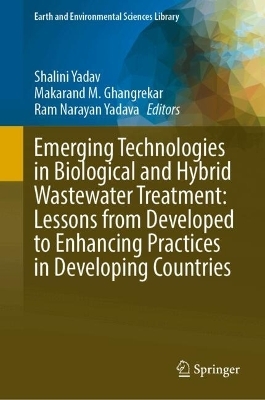
Emerging Technologies in Biological and Hybrid Wastewater Treatment: Lessons from Developed to Enhancing Practices in Developing Countries
Springer International Publishing (Verlag)
978-3-031-74514-0 (ISBN)
This book provides technical information on different biological and hybrid wastewater treatment systems for treatment of wastewater and reuse. The contained information helps in tracking their progress of such systems toward practical and field-scale applications. The book also includes strategies to be adopted for minimizing the losses and maximizing the benefits. Additionally, it includes methods for protecting the environment through the application of advanced biological and hybrid wastewater treatment technology. Furthermore, it discusses the crucial parts that science, technology, and innovation play in the formulation, implementation, and administration of wastewater treatment policy. It highlights the challenges that must be overcome to adopt biological and hybrid wastewater treatment infrastructure regulations successfully and provides some answers.
It investigates how the biological and hybrid wastewater treatment technology may be used in a wide variety of field's sets apart from other on-the-shelf publications on the market. Also, it delves into the core concepts of biological and hybrid wastewater treatment systems. It explores how these concepts can be modified to fit a variety of contexts and uses. Applications such as managing facilities, dealing with pandemics, urban wastewater treatment and reuse, farming, and other applications are included in this book. This book is helpful to researchers, entrepreneurs, professionals, planners, policymakers, environmental engineers, and others interested in biological and hybrid wastewater treatment system management strategies through the application of breakthroughs in biological and hybrid wastewater treatment technologies. Also, it is useful as a fundamental source of information and state-of-the-art knowledge to graduate students, university faculties, and researchers in the fields of environmental sciences/engineering, biological and chemical sciences, and NGO. It is also useful to entrepreneurs, professionals, and planners in policy and decision making at the local, state, and national levels for many countries.
Prof. Shalini Yadav is a professor in the Dept. of Civil Engineering and Head of the Centre of Excellence in Advanced Water and Environmental Research, Rabindranath Tagore University, Bhopal, India. Her research interests include solid and hazardous waste management, construction management, environmental quality, and water resources. She has executed a variety of research/consultancy projects in the area of environment and water science and has got rich experience in planning, formulating, organizing, executing, and management of R&D programs. She has got to her credit guiding of 35 M.Tech. and 15 Ph.D. students.
She has published more than 90 journal articles and technical reports. She is a member of the organizing and scientific committee of several conferences and a reviewer in several of international journals.
Prof. Makarand Madhao Ghangrekar is a professor in the Department of Civil Engineering and Institute Chair Professor, fellow INAE, member of European Academy of Sciences and Arts, former head of School of Environmental Science and Engineering, and former head of P. K. Sinha Centre for bioenergy and renewables and professor in-charge of Aditya Choubey Centre for Re-Water Research at Indian Institute of Technology Kharagpur.
He had been a visiting scientist at Ben Gurion University, Israel, and University of Newcastle upon Tyne, UK, under Marie Curie fellowship by European Union and had stints as faculty of various capacities in renowned engineering colleges and research institutes. He has been working in the field of anaerobic wastewater treatment, bioenergy recovery during wastewater treatment using microbial fuel cells and bio-electrochemical systems.
Prof. Ram Narayan Yadava holds position of Director of Research and International Affairs at Madhyanchal Professional University, Bhopal, (MP), India, and is an advisor of Patel Group of Institutions, India. He has worked as an advisor of AISECT Group of Universities and a founding vice-chancellor of the AISECT University, Hazaribag (Jharkhand), India. Prof. Yadava is also a founding member of Advanced Materials and Processes Research Institute (AMPRI) under the umbrella of Council of Scientific and Industrial Research (CSIR), India. His research interests include solid mechanics, environmental quality and water resources, hydrologic modeling, environmental sciences, and R&D planning and management. Dr. Yadava has executed a variety of research/consultancy projects in the areas of water resources planning and management, environment, watersheds management, and remote sensing.
Dr. Yadava has been recognized for four decades of leadership in research and service to the hydrologic, environment, and water resources profession. Dr. Yadava's contribution to the state of the art has been significant in many different specialty areas, including water resources management, environmental sciences, irrigation science, soil and water conservation engineering, and mathematical modeling. He has published more than 100 journal articles; four textbooks; sixteen edited reference books. He is a reviewer of scientific journals and a member of the scientific committee of international conferences.
An Overview of the Book Contents.- A Global Overview of Traditional Biological Treatment Technologies.- Membrane Technologies Membrane Bioreactors and Emerging.- Sequential Batch Reactor to Purify Wastewater from Olive Oil Mills Mixed with Municipal Wastewater.- Study on the Effectiveness of the Sequential Batch Reactor on the Reduction of Wastewater Pollution by Vegetable Oils from Oil Refining.
| Erscheinungsdatum | 28.11.2024 |
|---|---|
| Reihe/Serie | Earth and Environmental Sciences Library |
| Zusatzinfo | VII, 367 p. 95 illus., 78 illus. in color. |
| Verlagsort | Cham |
| Sprache | englisch |
| Maße | 155 x 235 mm |
| Themenwelt | Naturwissenschaften ► Biologie ► Ökologie / Naturschutz |
| Naturwissenschaften ► Geowissenschaften | |
| Technik ► Umwelttechnik / Biotechnologie | |
| Schlagworte | Bio-Electrochemical Systems • Biological wastewater treatment • Constructed wetlands • Developed countries • Developing Countries • energy recovery • Hybrid Wastewater Treatment Technologies • Life Cycle Assessment • Membrane technology • Traditional Wastewater Treatment Technologies |
| ISBN-10 | 3-031-74514-0 / 3031745140 |
| ISBN-13 | 978-3-031-74514-0 / 9783031745140 |
| Zustand | Neuware |
| Informationen gemäß Produktsicherheitsverordnung (GPSR) | |
| Haben Sie eine Frage zum Produkt? |
aus dem Bereich


